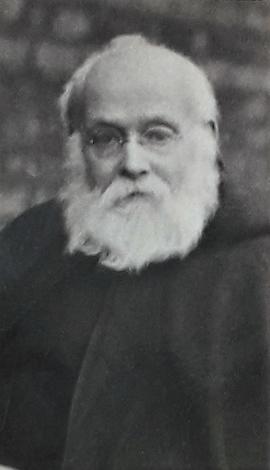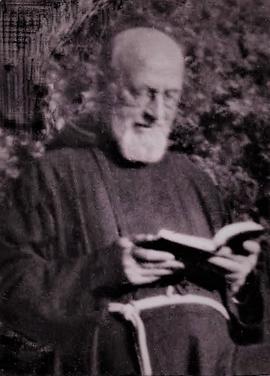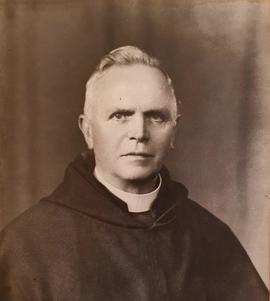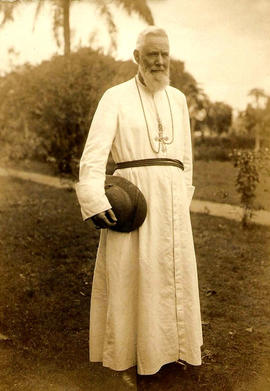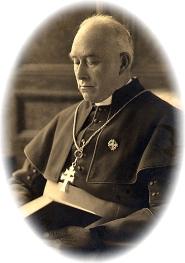Baptismal name: Peter Kelly
Religious name: Br. Elzear Kelly OFM Cap.
Date of birth: 25 June 1857
Place of birth: Rathnure, County Wexford (Diocese of Ferns)
Name of father: Marin Kelly
Name of mother: Margaret Kelly (née Curran)
Date of reception into the Capuchin Order: 6 Jan. 1884
Date of first profession: 2 Feb. 1885
Date of final profession: 8 Dec. 1890
Ministries: Questor, Rochestown Friary, County Cork; Sacristan, Church Street Friary, Dublin, 1915-37
Date of death: 11 Mar. 1937
Place of death: Church Street Friary, Dublin
Baptismal name: Jeremiah Kelleher
Religious name: Fr. Patrick Kelleher OFM Cap.
Date of birth: 1 Apr. 1887
Place of birth: Coolea, Ballyvourney, County Cork (Diocese of Cloyne)
Name of father: Patrick Kelleher (Farmer)
Name of mother: Honora Kelleher (née Lynch)
Date of reception into the Capuchin Order: 26 Aug. 1906
Date of first profession: 17 Sept. 1907
Date of solemn profession: 21 Jan. 1912
Date of ordination (as priest): 5 July 1914
Date of death: 26 Sept. 1959
Place of death: Rochestown Capuchin Friary, County Cork
Place of burial: Cemetery, Rochestown Capuchin Friary, County Cork
Baptismal name: James Kelleher
Religious name: Br. Didacus Kelleher OFM Cap.
Date of birth: 4 Aug. 1873
Place of birth: Watergrasshill, County Cork (Diocese of Cloyne)
Name of father: Willliam Kelleher
Name of mother: Catherine Kelleher (née McCarthy)
Date of reception into the Capuchin Order: 29 June 1895
Date of first profession: 29 June 1896
Date of final profession: 9 July 1899
Missionary activities: Travelled to the United States in May 1914
Date of death: 3 May 1947
Place of death: St. Bonaventure’s Friary, Cork
Place of burial: Cemetery, Capuchin Friary, Rochestown, County Cork
From the ‘Necrology of the Western American Province’ (2005):
James Kelleher was born near Watergrasshill in County Cork in August 1873. He was received into the Capuchin Franciscan Order in June 1895, took Didacus as his religious name, and was solemnly professed as a brother in July 1899. After a few years he and Fr. John Butler OFM Cap. were assigned to the new Capuchin mission in the United States. In 1914 they arrived in Paradise near Abbottstown in Pennsylvania. Here Br. Didacus helped the friars in caring for the church, the sacristy, and especially the Altar. In 1931 he was transferred from Abbottstown and ministered for several years at other locations in the American mission. After completing his assignment in the United States, he returned to Ireland. The remining years of his religious life were lived as a cook and sacristan at various friaries in the home province. For a short time, he ministered in Holy Trinity Friary in Cork. He died at St. Bonaventure’s Hostel in Cork on 3 May 1947 and was laid to rest in the cemetery adjoining the Capuchin Friary in Rochestown in County Cork.
Patrick Kelleher was born in Coolea near Ballyvourney in County Cork on 28 February 1912. His early schooling was in Coolea National School and in the Capuchin College in Rochestown in County Cork. He was received into the novitiate in Kilkenny in October 1929 and took David as his religious name. He undertook a formidable course of academic studies obtaining a Bachelor of Arts (1933) and later a Master of Arts (1934) from University College Cork. He was solemnly professed as a Capuchin friar in St. Bonaventure’s in Cork in October 1933. Following three years of theological studies in Ard Mhuire Friary in County Donegal, he was ordained to the priesthood in October 1937. He was sent to Rome after his ordination and spent six years at the International Capuchin College from 1937 to 1943, taking a Doctorate in Theology and a Licentiate in Scripture from the Pontifical Gregorian University. He also obtained a Diploma in Library Science from the Vatican Library. His time in Rome coincided with the difficult years of conflict in Italy during the Second World War. He returned to Ireland in 1943 and he resided in Ard Mhuire Friary for the remainder of his life, teaching dogmatic theology and liturgical and spiritual theology (1943-72). Aside from his pastoral work, he served as guardian (local superior) of the Ard Mhuire community for two terms and was the local vicar for eleven years. He also served on the Provincial Definitory (Council) from 1955 to 1958. He also retained a life-long interest in promoting the temperance cause. He died on 21 November 1995 and was buried in the cemetery attached to Ard Mhuire Friary in County Donegal.
Baptismal name: Patrick Kelleher
Religious name: Fr. David Kelleher OFM Cap.
Date of birth: 28 Feb. 1912
Place of birth: Coolea, Ballyvourney, County Cork (Diocese of Cloyne)
Name of father: Daniel Kelleher (Farmer)
Name of mother: Johanna Kelleher (née Mullane)
Date of reception into Capuchin Order: 3 Oct. 1929 (at Kilkenny)
Date of first profession: 4 Oct. 1930
Date of solemn profession: 4 Oct. 1933
Date of ordination (as priest): 10 Oct. 1937 (Ard Mhuire Capuchin Friary, County Donegal)
Educational attainments: BA (1st class hons.) and scholarship, UCC, (1933); MA, UCC, (1934); Doctor of Sacred Theology, (1940); Licentiate of Sacred Scripture, (1942).
Leadership positions: Provincial Definitor (Councillor), 1955-8; Custos General, 1958-61
Date of death: 21 Nov. 1995
Place of death: Ard Mhuire Capuchin Friary, County Donegal
Place of burial: Cemetery, Ard Mhuire Capuchin Friary, County Donegal
Michael Kelleher was born in Ballyvourney in County Cork on 3 June 1919. He was educated in Rochestown Seraphic College (County Cork), University College Cork and at the theological house in Ard Mhuire Capuchin Friary in County Donegal. He joined the Capuchin Franciscan Order in 1937 (taking Cyril as his religious name) and was ordained to the priesthood in 1946. From 1947, he was involved in various ministries with the Capuchins in what is now the Province of Our Lady of Angels in the Western United States, as director of clerics at Old Mission Santa Inés in Solvang (California) and later as Associate Pastor and Pastor. He was the director of clerics at St. Patrick’s Novitiate in Wilmington, Delaware, and served as both teacher and principal at St. Francis High School in La Cañada-Flintridge, California. He also served as guardian (local superior) of San Lorenzo Seminary in Santa Inés. For a time, he was also guardian and director of clerics at San Buenaventura Friary in San Francisco. He was also Vice Provincial of what is now the Province of Our Lady of Angels and was mission director while residing at Old Mission Santa Inés in Solvang. He died on 17 January 2002 in St. Francis Hospital in Santa Barbara and was buried in the cemetery adjoining San Lorenzo Seminary in California.
Baptismal name: Michael Kelleher
Religious name: Fr. Cyril Kelleher OFM Cap.
Date of birth: 3 June 1919
Place of birth: Ballyvourney, County Cork (Diocese of Cloyne)
Name of father: John Kelleher
Name of mother: Abby (Abigail) Kelleher (née Forde)
Date of reception into the Capuchin Order: 3 Oct. 1937
Date of first profession: 4 Oct. 1938
Date of final profession: 4 Oct. 1941
Date of ordination (as priest): 20 June 1946
Educational attainments: BA 1st class hons. (1941); MA, 1st class hons. (1942)
Missionary activities: Travelled to the Western United States Mission on 29 July 1947
Leadership positions: Principal, St. Francis High School, La Cañada, California, 1956-71; Assistant Custos, 1959-61, 1962-5; Vice-Provincial Minister, 1973-6.
Date of death: 17 Jan. 2002
Place of death: St. Francis Hospital, Santa Barbara, California
Place of burial: Cemetery, San Lorenzo Seminary, Santa Inés, California
Baptised: 2 October 1872 in Duagh, County Kerry
Entered novitiate: 27 April 1889, South Monastery, Cork
Reception: 24 December 1890
Professed: 24 December 1892
Died: 22 April 1958, Mount St Joseph, Cork
Interred: Blessed Edmund Rice Cemetery, Mount St Joseph, Cork
John Kavanagh was born in Mountmellick in Queen’s County (later County Laois) on 12 June 1876. Having spent some years in the Seraphic College in Rochestown, County Cork, he was received into the Capuchin Order in March 1893. He was ordained a priest in Dublin on 23 February 1902. Soon after his ordination he was stationed in Kilkenny as a Professor of Philosophy, but most of his life as a priest was spent in Dublin and in Cork. An accomplished scholar, Kavanagh spent many years in libraries and archives in England, France, Italy, Spain and Belgium, transcribing thousands of documents in a very clear hand, recording everything relating to the Irish Capuchins which could be discovered overseas. His work in transcribing the seventeenth-century Latin text, the ‘Commentarius Rinuccinianus’, published by the Irish Manuscripts Commission in six volumes between 1932 and 1949, is well known. His extremely important corpus of manuscripts, surrogate copies and transcribed materials for early Capuchin history are now extant in the Irish Capuchin Archives. He served as Provincial Archivist for the Capuchin Order in Ireland from 1919 to 1958. In 1918 he was appointed to investigate the cause of two seventeenth century Irish Capuchin martyrs, Fr. Fiacre Tobin OSFC (d. 1656) and Fr. John Baptist Dowdall OSFC (d. 1710). Kavanagh also had a life-long interest in Fr. Theobald Mathew OSFC (1790-1856) and amassed a huge quantity of research and documentary material relating to his life and nineteenth-century temperance campaign. In recognition of his contribution to Irish historical scholarship, the National University of Ireland awarded him an honorary Doctorate of Literature (D. Litt.) in 1947. Outside of academia, Kavanagh was a well-known preacher, missionary, and retreat-giver. In 1924 he was asked to travel to the United States where he spent several months assisting Irish Capuchin friars in missionary and preaching work. He was also a long-time incumbent of the position of Secretary of the Irish Capuchin Province (1922-31; 1937-55) and was elected Provincial Deifintor (Councillor) in 1931. His later years were blighted by dementia and he died on 16 May 1965 in the Bon Secours Hospital in Dublin. He was buried in Glasnevin Cemetery.
Baptismal name: John Kavanagh
Religious name: Fr. Stanislaus Kavanagh OFM Cap.
Date of birth: 12 June 1876
Place of birth: Mountmellick, Queen’s County (County Laois), Diocese of Kildare & Leighlin
Name of father: Edward Kavanagh
Name of mother: Joanna Kavanagh (née Costello)
Date of reception into the Capuchin Order: 20 Mar. 1893
Date of first profession: 2 July 1894
Date of final profession: 25 Dec. 1897
Date of ordination (as priest): 23 Feb. 1902
Educational attainments: Doctor of Literature (D. Litt.), 1947
Leadership positions: Provincial Definitor, 1931-4; Provincial Secretary, 1922-31, 1937-55; Provincial Archivist, 1919-1958
Date of death: 16 May 1965
Place of death: Bon Secours Hospital, Glasnevin, Dublin
Place of burial: Glasnevin Cemetery, Dublin
Thomas Joyce was born near Urlingford in County Kilkenny on 15 June 1906. He joined the Capuchin Franciscans in October 1926 and took Gerard his religious name. He enjoyed a brilliant academic career in Rome (gaining a Licentiate in Canon Law) and in Ireland (a Higher Diploma in Education from University College Cork). He was ordained to the priesthood at Ard Mhuire Capuchin Friary in County Donegal in June 1933. In 1937 he travelled to the Prefecture of Victoria Falls in Northern Rhodesia (later Zambia) and ministered in the region around Sihole for seven years. He died of blackwater fever at the mission outpost of Kalabo on 12 July 1944 at the age of just thirty-five. Fr. Capistran Singleton OFM Cap., a fellow missionary friar, ministered to him in his final hours while Br. Alexius Paolucci OFM Cap. made his coffin with some wooden planks intended for the new church.
Baptismal name: Thomas Joyce
Religious name: Fr. Gerard Joyce OFM Cap.
Place of birth: The Islands, Urlingford, County Kilkenny (Diocese of Ossory)
Date of birth: 15 June 1906
Name of father: Patrick Joyce (Farmer)
Name of mother: Mary Joyce (née Hennessy)
Date of reception into Capuchin Order: 4 Oct. 1926
Date of first profession: 5 Oct. 1927
Date of final profession: 5 Oct. 1930
Date of ordination (as priest): 29 June 1933
Educational attainments: BA (1930); LIC (Rome, 1933-6); returned from Rome in 1936 to prepare for missionary work in Africa
Missionary activities: Travelled to the Prefecture of Victoria Falls, Northern Rhodesia (later Zambia), in 1937
Date of death: 12 July 1944
Place of death: Kalabo, Northern Rhodesia (died of Blackwater Fever). Fr. Capistran Singleton OFM Cap. was with him.
Joseph Shanahan B.Sc., C.S.Sp. (1871–1943) was an Irish-born priest of the Congregation of the Holy Spirit (Spiritans), who served as a bishop in Nigeria – first as prefect apostolic of Lower Niger (now Onitsha)[1] and then as vicar apostolic of Southern Nigeria.
John Mary Harty was born in Murroe, County Limerick in 1867. He received his education at Jesuit College, Limerick, Saint Patrick's College, Thurles, and Maynooth. He entered First Philosophy on 1 September 1887 and was ordained priest on 20 May 1894 in Clonliffe College, Dublin, by Dr. William Walsh of Dublin. The next year, after a competitive examination, he was appointed to the Chair of Dogmatic Theology in Maynooth, the year after ordination being spent in postgraduate study in Dunboyne.
He published treatises on Grace and on the Sacraments. Later he was appointed Senior Professor of Moral Theology and held this chair till his appointment as Archbishop on the resignation of Dr. Fennell. The voting of P.P.'s for new Bishop was Dr. Harty, Maynooth College - 20; Dr. John Slattery, Thurles College - 10; Rev. Tom F. Power P.P. V.F. Galbally - 8; Mgr. Riordan, Rector, Irish College, Rome - 2; Canon Arthur Ryan P.P. V.G. - 6. Tipperary - 1; Dr. Kelly, Bishop of Ross - 1.
Dr. Harty was appointed in November 1913 and consecrated in Thurles on 8 January 1914 by Archbishop Fennelly. After consecration the priests of the Archdiocese presented him with a motor car costing Ł500. His gentle manners and kindly disposition endeared him to all - both clergy and laity. For a number of years before his death, ill-health restricted his activities. He requested a Coadjutor from the Holy See, indicating that his wish was Dr. Jeremiah Kinnane, Bishop of Waterford since 1932, and a priest of the Archdiocese. In 1942, the Holy See acceded to his wish and Dr. Kinnane resigned his see of Waterford and became Coadjutor Archbishop of Cashel and titular Archbishop of Dercos and Dean of Cashel Diocesan Chapter, with Cashel as his parish.
Totally confined to the Archbishop's Palace by progressive debility from this period till his death on 1 September 1946, Archbishop Harty died aged 79 years. He was for many years President of the Catholic Truth Society of Ireland (from 14 October1914) and Patron of G.A.A. from 1928.
Dr. Harty received letter of appointment as Archbishop on 2 December 1913, and Bulls of appointment on 8 December 1913. The Bulls stated that perpetual administration of the see of Emly is attached to the see of Cashel. Dr. Harty had Pallasgreen and Solohead as mensal parishes - latter permitted by Rome (January 1915) while Dr. Fennelly lived.
